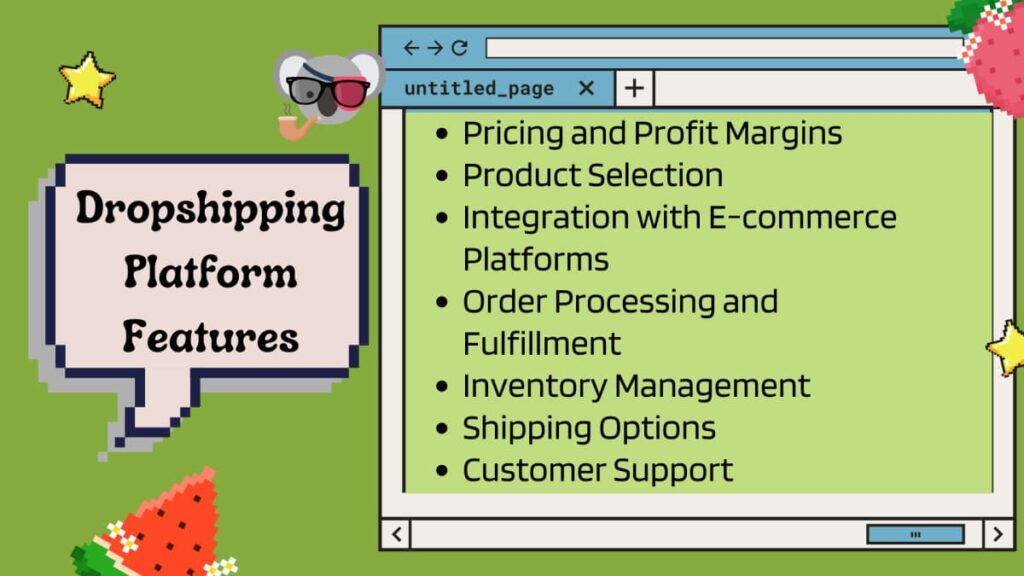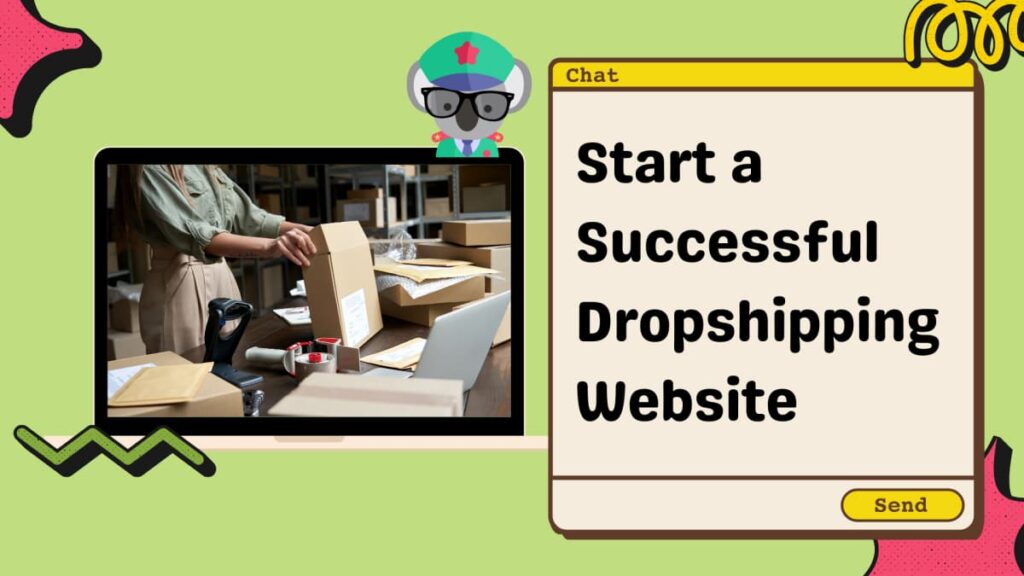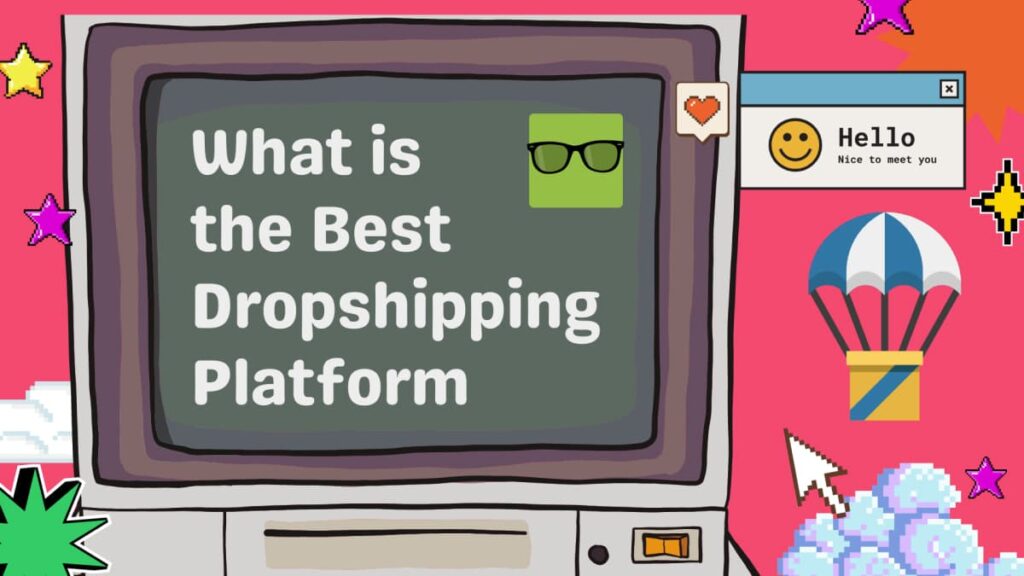The success of your e-commerce venture largely depends on working with the right platform for your niche.
The right decision could potentially catapult your business towards exponential growth.
Among the myriad factors to contemplate when establishing an e-commerce business, the platform is essentially the backbone of your business. It serves as a vital bridge linking sellers, buyers, and suppliers, ensuring seamless transactions.
Let’s thoroughly review the importance of getting your platform right, the pros and cons of dropshipping platforms, and what features you should analyze and look for before deciding on your dropshipping platform.
Importance of Choosing the Right Dropshipping Platform
Choosing the right dropshipping platform can be a game-changer. It’s not just about finding a platform that offers a wide range of products, but also one that provides reliable service, user-friendly features, and strong customer support.
It’s the customer’s primary access point for your products. So, offering customers a platform with a user-friendly interface for a seamless shopping experience should be your priority.
Factors that define the worth of a dropshipping platform include its range of product offerings, reliability, user-friendly features, customer service quality, and last but never least, its pricing policies.
A platform with a narrow product range, for example, might limit your outreach and hamper the scope of your business. Bumpy service and less user-friendly features can turn away potential buyers in droves, and an overly expensive platform can quickly burn a hole in your pocket.
The best platform for dropshipping you choose should present your products and brand professionally and formally, helping you develop the company’s reputation and image. It should provide tools to effectively and promptly process and track orders, manage inventory, and respond to customer’s feedback and requests.
The ultimate goal is growing your business, so choose a dropshipping platform that can expand as your company does. Check the platform’s readiness to manage a growing volume of orders, products, and customers without experiencing any performance issues.
And finally, ensure your business plan and budget are compatible with the platform’s price. Many of the platforms include fees and expenses for products or subscriptions.
Remember, in the world of online business, it’s imperative to stay ahead of the pack. Your dropshipping platform choice wouldn’t just impact digital output but also your brand’s reputation.
With that noted, lets look at the features to consider when choosing a dropshipping platform.
Features to Look for When Researching Dropshipping Platforms

When looking to find the best e-commerce platform for dropshipping, you’ll realize it’s essential to take a critical look at specific features. These features provide a benchmark to gauge each platform’s performance.
Pricing and Profit Margins
Each dropshipping platform has its fees and expenses, so select one that fits you and corresponds with the company’s return on investment. Find one that offers high-margin dropshipping opportunities and asses how the pricing may change your business growth.
Product Selection
The products certain dropshipping platforms accommodate should include different categories of physical or digital products. If you choose a digital product route you can get more benefits using a platform set up entirely for digital products. Ultimately, see if the platform offers diverse products that can answer customers’ needs reliably. This opportunity enables you to increase your offer variety and have more dropshippers available to you.
Integration with E-commerce Platforms
The best platforms for dropshipping offer to improve your store’s value. It offers task and workflow automation and increases your business’s overall potential. The integration will facilitate the management of your business and streamline processes.
Order Processing and Fulfillment
Order processing and fulfillment of a dropshipping platform will affect the stability and efficiency of your business. Look for scalable dropshipping platforms that facilitate client experience, assist in avoiding any logical issues, and support your company’s expansion.
If you choose Shopify as your dropshipping platform, we have a walkthrough of how to setup and use Shopify order fulfillment. We recommend bookmarking this for later.
Inventory Management
Partnering with a dropshipping platform facilitates inventory management. Research whether platforms notify businesses promptly on low-stocks and real-time coordination to avoid losing customers.
Shipping Options
Compare dropshipping platforms and look for the offered shipping services and management of your shipping requirements. Some companies won’t settle if the platform doesn’t offer express shipping or if there is a lack of worldwide shipping.
Customer Support
Check for the platform’s reliable customer support, communication channels, and responsiveness. Some dropshipping platforms offer forums and educational content that come in handy to customers, resulting in increased user experience.
Top 11 Dropshipping Platforms

With so many dropshipping platforms available, it’s difficult to choose the best one without intensive testing and trial and error.
But don’t worry, we’ve already been there. Here are our best dropshipping platforms of 2024.
1. Shopify
Shopify is a dropshipping platform initially created to solve the lack of integrated services and e-commerce complexity. You can use it to launch a legitimate dropshipping store and function separately to maintain your company’s website and brand. It is the first choice for many entrepreneurs, offering inventory management, transaction processing, and more.
Shopify Pros
- User-friendliness, simplicity, and modern layout – signing up takes just a few minutes.
- Well-known for excellent customer support – customer questions are answered quickly.
- Has a forum educating users on frequently asked questions and issues.
- Easy payment process requiring no extra setup.
- A variety of free and paid themes – use the latest templates to design your shop effortlessly.
- SEO tools at your disposal to help increase your brand’s visibility and attract more traffic.
- Has an encrypted checkout procedure and sophisticated fraud detection tools.
Shopify Cons
- The lack of email hosting can complicate your email marketing campaign.
- Uses Liquid as a coding language, which is unfamiliar to many designers.
- The Shopify payment method is not available in some countries where customers will have to go through third-party payment systems and pay transaction fees.
- Shopify saves all your data on their custom platform, making moving it to another website difficult.
Shopify’s Best For
Improving the functionality of your business with a wide range of plugins and applications with Shopify such as the Koala Skip To Checkout App. It offers the fastest and simplest method for your customers to check out right from the product page.
Cost
Shopify offers three pricing plans paid monthly:
- Basic ($24)
- Shopify ($69)
- Advanced ($299)
Bear in mind that the prices might range according to the store location.
2. Woocommerce
Use Woocommerce, an open-source plugin for WordPress, to sell everything from digital products to tangible things on your website, transforming it into a fully working e-commerce platform. It makes maintaining the website easier with a responsive design and customizable features.
Woocommerce Pros
- No need to limit your company activities – advertise your products on any platform by generating a product feed with a plugin.
- Works with any WordPress theme, allowing selection of any layout you want for your business.
- Easy to set up in WordPress, resulting in selling your products immediately.
- It integrates easily with other systems such as CRM, management software, or other shipping services.
- Offers SEO tools to increase search engine visibility for your brand, which are more manageable than other e-commerce tools.
Woocommerce Cons
- You can’t use Woocommerce if you’re not a WordPress user.
- Be aware of some hidden expenses – integrating tools, customized themes, or advanced features comes with additional fees.
- Might influence your website performance as this requires more memory and processing power.
- The update policy might be challenging for users, so it’s advisable to do a closed-environment test first.
Woocommerce’s Best For
Low-cost Dropshipping – small and medium businesses searching for a way to an e-commerce store are ideal candidates for using Woocommerce. It’s easy to set up with a range of features offered and doesn’t require any professional help.
Cost
This is a completely free plugin for downloading and setting for WordPress users. However, if you prefer to add other plugins or systems for facilitating your work you will be exposed to some fees. So, you can test for free and see if it aligns with your business needs.
DSers
DSers is a versatile dropshipping application for AliExpress that provides the opportunity to sell products by importing an unlimited number of items. It can handle dozens of orders at once, help you discover more affordable suppliers, and automate tiresome and consuming business activities.
DSers Pros
- It improves the efficiency of order processing, especially for users handling many orders.
- DSers allows one account to manage several Shopify stores.
- Offers automatically carried out order fulfillment and inventory management.
- Provides automatization for pricing on imported goods.
- It offers seamless integration with other dropshipping tools such as Woocommerce.
- Provide excellent customer support available through several channels for a quick response to any issue.
DSers Cons
- The shipping period might be longer since it works with AliExpress, which imports from China.
- Although it integrates with some, it doesn’t with most dropshipping platforms.
- The interface might be difficult for some users at the beginning.
DSers’s Best For
It is dedicated to simplifying and streamlining the dropshipping business. It provides the opportunity to obtain several suppliers for a single product by taking advantage of the multiple supplier management features.
Cost
The most affordable of DSer’s four pricing plans is the Basic plan – you can process a limit of 3000 orders monthly and access three stores. The monthly cost of the paid plans ranges from $19.99 to $499, differentiating for the number of orders and stores you can tie together.
Spocket
Spocket is a dropshipping platform offering rapid access to reliable US and EU companies. You can find various product categories, from clothes to toys and accessories. It handles all orders and deliveries through your website backend, offering a comprehensive dropshipping solution.
Spocket Pros
- Holds different categories of products which will facilitate the process of identifying your dropshipping niche if you haven’t found it yet.
- It has a long-term screening for suppliers, making sure that there are no low-quality products available.
- It can integrate with other e-commerce platforms and simplify the process of shipping, orders, and payments.
- You can test for free Spocket products to validate their quality before you start to sell them.
- Provides discounts for premium memberships, enabling you to reduce costs while expanding your company.
- Establish a strong client brand using Spocket’s branded invoicing service.
Spocket Cons
- The shipping fees are high, sometimes even surpassing the cost of the items themselves.
- There are some complaints about Spocket’s customer service not being effective enough.
- It doesn’t offer a free package plan, as the other dropshipping platforms do.
Spocket’s Best For
Spocket is one of the top dropshipping platforms offering quick shipping and top-notch products for companies in the EU and the US.
Cost
Spocket offers four pricing packages ranging from $39.99 to $299, depending on the features you’d like to use to match your business plan. It offers a free 14-day trial for testing the platform and the option to cancel it anytime.
Salehoo
A dropshipping platform and a directory that links reputable manufacturers and distributors with online retailers. It serves as a platform for sellers to locate renowned suppliers and assist them in avoiding the risks associated with suspicious parties.
Salehoo Pros
- Using market research tools helps you focus on products that would be most beneficial to your target audience. It provides data you’ll need, like competition rates, trends, and sale costs, to decide easily which products will work best in your store.
- The layout is pretty simple, it is configured like an internet store, so you’ll have no trouble managing it.
- It offers the opportunity for integration with Shopify.
- Provides email templates to facilitate your process of contacting suppliers.
Salehoo Cons
- Salehoo’s product catalog is significantly smaller compared to what other dropshipping platforms offer. If you’re planning to start a dropshipping business, this might not be the right platform, as you’ll have difficulties identifying the perfect niche.
- Dropshipping business owners might encounter earning issues since Salehoo requests more daily orders for bulk purchases, and most beginners have few orders.
Salehoo’s Best For
This dropshipping platform is best for already-settled businesses that order in bulk. It’s also good for those who need top-quality market research tools to target desired consumers more easily.
Cost
Salehoo offers several pricing plans, from basic to premium as well as lifetime access to Salehoo Educate. Choose between the Basic ($27) and Premium ($97) monthly plans.
Zendrop
As a dropshipping platform, Zendrop offers the automatization of tasks leaving you to focus on your business growth. It allows connecting with reputable suppliers and saves you the shipping and packing headaches since the company whose items you choose to sell does that.
Zendrop Pros
- Simple and easy-to-use interface that attracts customers.
- Seamless product sourcing and inventory management.
- A wide range of products in almost every category.
- Exceptional customer support and resources for educational content.
- The platform keeps a record of comprehensive reporting and analytics.
Zendrop Cons
- Offer limited possibilities for branding and package customization.
- It has a longer shipping period than other platforms connected with currency limitations and shipping overseas.
- It requests transaction costs and commissions.
- There might be some variations in supply levels and shortages.
Zendrop’s Best For
An ideal dropshipping platform for beginners. It offers a free plan and no limitation or request for a dedicated number of orders.
Cost
Zendrop offers a free package plan which is great for testing the platform, or try the Pro and Plus packages at the cost of $49 and $79 monthly.
Modalyst
Modalyst is a dropshipping platform emphasizing item selling in the clothing and fashion sphere. It will provide the opportunity to connect with apparel suppliers eager to partner and dropship products for businesses.
Modalyst Pros
- Works with high-quality products and reputable brands and stands out as a reliable partner.
- You can test for free, Modalyst offers a free plan.
- Seamless integration with other dropshipping platforms like Shopify.
Modalyst Cons
- Focused on fashion, so it doesn’t offer a variety of products.
- The shipping period is often longer than expected since it imports products from China.
- Every order suffers an additional fee.
- You’ll have to choose a more expensive pricing plan to access the premium suppliers for high-quality goods.
Modalyst’s Best For
A business in the fashion industry is the perfect candidate for this platform. No matter what size your company is, Modalyst offers different and tailored solutions for each.
Cost
Similarly to other dropshipping platforms, Modalyst has three pricing plans: Hobby – which is free, Start up – $35 and Pro – $90 monthly.
Inventory Source
This dropshipping platform is known for synchronizing order and inventory data between the selected dropshipping suppliers and their channels, allowing the user’s platforms to immediately update whenever a supplier makes changes to their product data.
Inventory Source Pros
- Option to select the services and features you want to use, including automation and integration with Shopify stores.
- It offers more than a dozen products and it can additionally assist you in finding products or suppliers not on their list of vendors.
- The inventory management is done in real-time and effortlessly.
- It provides an opportunity for using a free account.
Inventory Source Cons
- Purchasing goods from different suppliers and reselling them in other markets are subject to additional expenses.
- The biggest con is the lack of market research tools that other platforms offer.
Inventory Source’s Best For
It is best for businesses that want to manage several suppliers, streamline the dropshipping process, and automate different parts of running their dropshipping store.
Cost
Inventory Source provides three packages, each offering different features:
- Directory Account – free
- Inventory automation – $99
- Full automation – $199
Facebook Marketplace
Facebook Marketplace emerged as a popular dropshipping platform in recent years and gained immediate popularity for online purchases.
Pros
- Provides a sense of trust and familiarity since it is connected with users’ Facebook accounts.
- It lacks fees and focuses on advertising, making it a high-margin profit dropshipping option.
- Personalizes the shopping experience, targeting users with products that they need.
Cons
- There is limited platform accessibility in some countries.
- The platform doesn’t offer money transfer and product shipment services.
- The sellers using this platform are not subjected to any qualifications or verifications to guarantee their reputation.
Facebook Marketplace’s Best For
Attracting customers is the main advantage this platform has since it has a large network of users who trust it. Growing your business has a better percentage on the Facebook Marketplace.
Cost
It is a free platform that only requires a fee when you sell a product.
Etsy
Etsy is a dropshipping platform focused on selling handmade and vintage products. It allows small businesses to connect with a broader target audience and grow their business.
Etsy Pros
- It caters to a distinct niche and easily connects with potential customers seeking specific products.
- Easy to set up with a wide array of features and tools.
- The best platform for beginners since it has a community forum for any issues users might have.
- The payment method it offers is highly secure.
Etsy Cons
- The platform often updates its policies, which can impact the business’s operations.
- Standing out might be difficult since the competition is fierce.
- The transaction fees might influence your earnings.
- Sets transaction restrictions for beginners, which may limit the initial amount they make.
Etsy’s Best For
Etsy is best for small to medium businesses searching to expand their crafted products.
Cost
Etsy charges several fees for selling products on the platform. For more detailed information, check their website.
TikTok
TikTok as a platform offers more features, including dropshipping and promoting reselling products by integrating your store into an account. It may take some time before you start making money from dropshipping on this platform.
TikTok Pros
- An easy start – you won’t need to invest much money.
- It has a massive traffic source, so it will be easier to target consumers.
- Using the platform is a great marketing strategy for your business.
TikTok Cons
- Prepare for a lot of competition, meaning you’ll need to stand out.
- Since its primary use is not dropshipping, it doesn’t mean you will generate many sales.
- It doesn’t offer great customer support, leaving the consumers with many unsolved issues.
TikTok’s Best For
Companies that follow the trends will thrive on TikTok. Selling viral products on the platform will help you get a great profit.
Cost
Signing up for an account on TikTok is free, but each transaction involves commission fees for sellers calculated as a proportion of the sale price.
Tips to Start a Successful Dropshipping Website

Starting a dropshipping website is not the easiest operation, but following some steps might facilitate the process for you.
Choose a Niche
Identify a niche for your business and the direction you want for your business. Conduct market research and learn what you’re passionate about and what offers high profit.
Market Research & Source Products
The market research will point out the best products and the audience you’ll need to target. Before selecting a niche, use the Koala Inspector to analyze which market is not overrun by the competition.
Research & Find Suppliers
Choose trustworthy suppliers as your partners. Research which ones provide high-quality products, prompt shipping, and great customer support.
Choose the Best Platform for Your Dropshipping Products
Selecting the best platform for dropshipping takes research. If you’re looking for one that offers versatility, security, and great features for your business, Shopify is the one for you.
Before deciding, analyze thoroughly the incentives your business has and how much they align with each platform.
Experiment with Different Marketing Channels
Advertising calls for a great marketing strategy and presence on several marketing channels. From paid ads and partnering with influencers to simple social media posts – increasing your traffic will prove effective.
Build a Brand
Make your business recognizable – the marketing strategies you employ paired with high-quality services will bring you the brand recognition needed for a successful dropshipping business.








